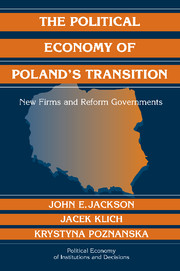Book contents
- Frontmatter
- Contents
- List of Tables
- List of Figures
- Acknowledgments
- List of Abbreviations
- 1 Why Poland?
- 2 The Dynamics of the Polish Political Economy, 1990–1997
- 3 Creative Destruction and Economic Transition
- 4 The Social and Distributional Costs of Transition
- 5 Individual Attitudes and Voting
- 6 De Novo Job Creation and Election Returns
- 7 Liberal Economic Interests and Seat Allocations
- 8 The Political Economy after 1997
- 9 The Political Economy of Transition: Why Poland?
- Appendix A Assessing Measures of New and Small Firms in Poland
- References
- Index
- Titles in the series
9 - The Political Economy of Transition: Why Poland?
Published online by Cambridge University Press: 07 August 2009
- Frontmatter
- Contents
- List of Tables
- List of Figures
- Acknowledgments
- List of Abbreviations
- 1 Why Poland?
- 2 The Dynamics of the Polish Political Economy, 1990–1997
- 3 Creative Destruction and Economic Transition
- 4 The Social and Distributional Costs of Transition
- 5 Individual Attitudes and Voting
- 6 De Novo Job Creation and Election Returns
- 7 Liberal Economic Interests and Seat Allocations
- 8 The Political Economy after 1997
- 9 The Political Economy of Transition: Why Poland?
- Appendix A Assessing Measures of New and Small Firms in Poland
- References
- Index
- Titles in the series
Summary
We began with the question, Why Poland? The answer in Chapter 1 was based on comparing the pace and early success of the Polish reforms, both economic and political, with those of other transitional countries. The comparisons suggested that Poland was a relative success, at least in the initial years, and that we could learn important lessons about transitions from studying the Polish transformation in detail. This chapter addresses the same question, but with a different meaning. We can now interpret the question in terms of what factors explain Poland's relative success. We have observed and analyzed in great detail the more and less successful aspects and consequences of Poland's transition. According to this interpretation, the answers are unique in some respects but broadly general in others. The challenge is to examine factors contributing to the Polish transition in the context of other political economies in Central and Eastern Europe.
LESSONS FROM THE POLITICAL ECONOMY OF TRANSITION
The answer begins with the two main lessons from our study. Our analysis suggests that Schumpeter's model of economic development, though nearly a century old, is applicable in a broad range of settings. Successful development and transitions depend on what he called the creative destruction process in which firms with outdated technologies, organizational structures, or products are replaced by new enterprises embodying new forms. The presence and growth of these new enterprises stimulates a political constituency that supports liberal policies and continued economic reform.
- Type
- Chapter
- Information
- The Political Economy of Poland's TransitionNew Firms and Reform Governments, pp. 230 - 252Publisher: Cambridge University PressPrint publication year: 2005



